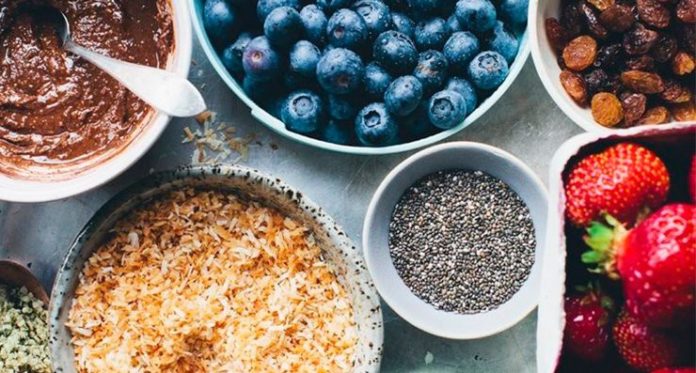
Though there is no legal or medical definition, superfoods are nutrient powerhouses that pack large doses of antioxidants, polyphenols, vitamins, and minerals. Eating them may reduce the risk of chronic disease, and prolong life, and people who eat more of them tend to be healthier and thinner than those who don’t.
Many foods purport to be superfoods, but not all deliver the same high doses of disease-fighting nutrients. Now, a new article published in the journal Food Technology has reviewed the science behind the claims and identified nine ‘superseeds’ and ‘superfruits’ that pack the greatest health benefits.
These superfoods include:
1. Chia Seeds: Packed with 10g of fiber and nearly 5g of protein per ounce (just under 3 tablespoons), the seeds — which come from a plant in the mint family — can absorb up to 10 times their weight in water, making for a fun addition to everything from puddings (think tapioca without all the sugar) to pancakes. Chia seeds can also be used in yogurt, homemade trail mixes, baked goods, commercial nutrition bars, beverages and snacks. They are high in omega-3 fatty acids, calcium, phytonutrients, vitamins, minerals and antioxidants. However, assertions that this ancient seed can lower blood pressure and make you lose weight have not been proven.
2. Flaxseeds: Flaxseeds are a good source of protein, fiber, antioxidants, and phytoestrogens in the form of lignans and omega-3 fatty acids. Available in either brown or golden varieties, both are equally nutritious. An ounce of these slightly nutty seeds contains nearly 8g of fiber, 12g of fatty acids, and more than a quarter of your daily recommended magnesium, which helps boost energy. The fiber helps with digestion, and there’s also some evidence that flax seeds can lower high blood pressure and cholesterol.
3. Sunflower Seeds: Often considered a traditional ballpark snack, sunflower seeds provide monounsaturated and polyunsaturated fats, protein, fiber, and vitamin E. The phytochemicals found in sunflower seeds — like choline, lignan, phenolic acids and betaine — have been linked to better cognitive functions and lower bad cholesterol, while the healthy fats may boost hormone levels and sex drive. Sunflowers are also the best whole food source of vitamin E, which acts to slow the effects of aging, boost the immune system, repair damage to cells, and possibly to prevent cancer and cardiovascular disease.
4. Pumpkin Seeds: For a tasty snack you can enjoy a la carte, roasted pumpkin seeds – also known as pepitas – are the hands-down winner. The green seeds are high in fat (14g per ounce) and relatively low in fiber (2g), but make up for it with nearly 10g of protein and a slew of minerals, including half or more of the daily recommended doses of copper, magnesium, manganese and phosphorous. Pumpkin seed oil has also been shown to relieve symptoms caused by an enlarged prostate – a common condition for men over 50.
5. Blueberries: Daily consumption of blueberries, which are packed with fiber, vitamins, minerals, fructose, and antioxidants, may reduce blood pressure and arterial stiffness. Antioxidants in blueberries are linked to the prevention/delaying of diseases such as cancer, heart disease, and the aging process. A 2012 study found that women who regularly (3 or more times a week) ate blueberries reduced their risk of heart attack by more than 30% compared to those who rarely ate the berries.
6. Acai Berries: Acai berries are a rich source of fiber, antioxidants, and the flavonoid anthocyanin. With a fatty acid ratio similar to olive oil, they are also a great source of heart-healthy fats. While they’ve been linked to a variety of health benefits, the anti-inflammatory properties of the acai berry are most strongly supported by evidence.
7. Tart Cherries: Like acai berries, tart cherries are high in anthocyanin and have high antioxidant activity. Reported benefits include enhanced sleep, anti-inflammation in arthritis and gout, and sports recovery (i.e., reduced soreness, faster recovery). The anthocyanin in tart cherries has been linked to a reduced risk of stroke, while animal studies indicate that tart cherries may also have significant weight management benefits, including reduced belly fat.
8. Avocados: More than just the main ingredient in guacamole, avocados have beneficial effects on cardio-metabolic risk factors that extend beyond their heart-healthy fatty acid profile. Research suggests that eating avocados could help lower levels of bad cholesterol, particularly among those who already have high cholesterol. In one study, participants experienced a 22% decrease in bad cholesterol and triglyceride levels and an 11% increase in good cholesterol after only a week of following an avocado-enriched diet. Avocados are also rich in phytochemicals, which have been reported to help prevent the development of certain cancers. A team of scientists who examined the the chemopreventive characteristics of avocados concluded that “individual and combinations of phytochemicals from the avocado fruit may offer an advantageous dietary strategy in cancer prevention.”
9. Cranberries: We know cranberry sauce as a staple at the holidays, but cranberries are a superfood that you should enjoy all year round. Cranberries have vitamin C and fiber, and are only 45 calories per cup. In disease-fighting antioxidants, cranberries outrank nearly every fruit and vegetable–including strawberries, spinach, broccoli, red grapes, apples, raspberries, and cherries. While cranberries have long been associated with benefiting urinary tract health, research also suggests they pack major benefits for heart health, cancer prevention, oral health, and glycemic response.
